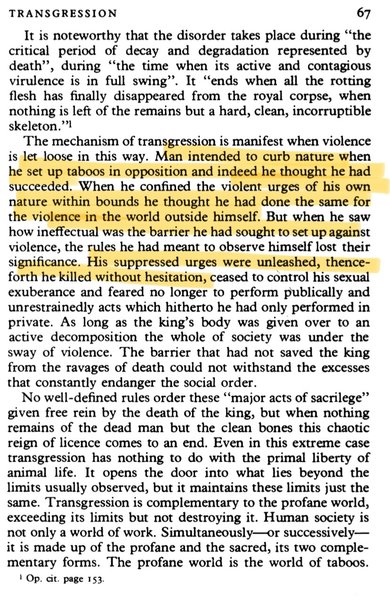eroticism



Medea’s violent infanticide is due to her suppressed urges being unleashed. her violent urges where stopped because of the law and the rules, however once Jason trades her for power and abandons her and nobody else would help her she has to turn to violence. seeing that the laws are ineffective Medea turns to violence.
Medea’s infanticide represents the eruption of suppressed violence once the boundaries of law, morality, and social order collapse.
Like Bataille describes, man creates taboos and laws to control the violence within himself and maintain order. Medea, as a woman and foreigner, was already confined by these external and internalized taboos—rules of marriage, motherhood, and civic obedience.
When Jason betrays her and the social world (Corinthian law, the king, the gods) fails to uphold justice, Medea recognizes the ineffectiveness of these barriers. The laws that once constrained her rage no longer carry meaning.
Her suppressed urges are unleashed—not as senseless brutality, but as a Bataillean act of transgression: a violent assertion of sovereignty that breaks through the limits of the profane world (rules, reason, order).
In light of Georges Bataille’s notion that man’s taboos are attempts to contain his own violent nature, Medea’s infanticide emerges as the eruption of suppressed violence once those boundaries collapse. The social and moral laws that had confined her—those of marriage, motherhood, and civic restraint—prove powerless when Jason betrays her and no external justice intervenes. Recognizing the futility of these taboos, Medea crosses the threshold Bataille calls transgression: she unleashes the violence that law had merely repressed, performing an act that dissolves the distinction between the profane and the sacred. Her crime thus becomes a Bataillean revelation—the moment when the suppressed inner nature of humanity violently exposes the fragility of its own civilization.

Ideas related to this collection